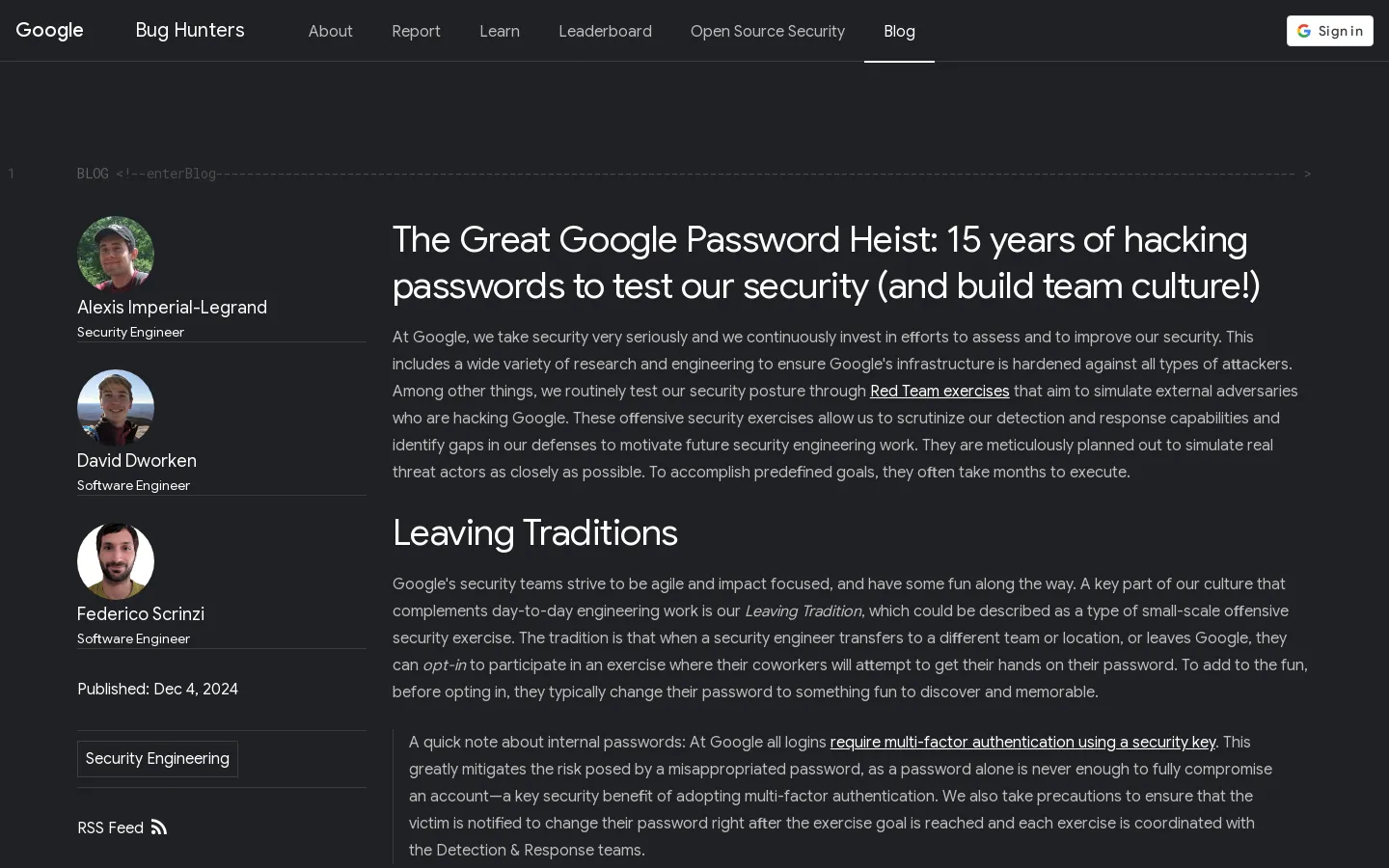
Google Launches Tutorial Program to Enhance Security Culture
/ 4 min read
Quick take - Google has introduced a comprehensive tutorial program designed to enhance its security measures, promote team culture, educate employees on vulnerabilities, and emphasize the importance of multi-factor authentication.
Fast Facts
-
Comprehensive Tutorial Program: Google has launched a tutorial program to enhance security measures, promote team camaraderie, and educate employees on multi-factor authentication (MFA).
-
Simulated Hacking Exercises: The program includes hands-on simulated hacking exercises to identify vulnerabilities and strengthen defenses against cyber threats.
-
Team Culture Initiatives: A unique “Leaving Tradition” fosters camaraderie by humorously engaging departing employees’ passwords, enhancing workplace bonds.
-
MFA Emphasis: The initiative highlights the importance of multi-factor authentication in securing accounts, reinforcing that passwords alone are insufficient for protection.
-
Proactive Security Engagement: By integrating security training into company culture, Google empowers employees to actively participate in maintaining the integrity of its systems.
Google Enhances Security Culture Through Innovative Tutorial Program
In a strategic move to strengthen its security framework, Google has introduced a comprehensive tutorial program designed to enhance its security posture, foster team camaraderie, and educate employees on the importance of multi-factor authentication (MFA). This initiative reflects Google’s commitment to safeguarding its infrastructure while promoting a positive workplace environment.
Key Objectives of the Tutorial Program
Enhancing Security Posture
At the core of this tutorial program is the continuous assessment of Google’s security framework. By conducting simulated hacking exercises, the program aims to identify potential vulnerabilities within the system and bolster defenses against cyber threats. This hands-on approach allows teams to actively engage in the security process, ensuring they are well-prepared for real-world challenges.
Promoting Team Culture
The tutorial introduces a unique aspect known as the “Leaving Tradition,” which adds a playful twist to the workplace environment. As departing employees leave the company, their passwords become humorous targets for colleagues. This light-hearted engagement not only strengthens bonds among team members but also cultivates a sense of camaraderie, making the workplace more enjoyable and cohesive.
Educating and Raising Awareness
A significant focus of the program is sharing insights and stories derived from security exercises with all engineers at Google. By disseminating knowledge about vulnerabilities and robust security practices, the initiative empowers employees—regardless of their specific roles—with the understanding necessary to contribute to a secure working environment.
Demonstrating Multi-Factor Authentication
The program emphasizes the critical role of multi-factor authentication in enhancing account security. By showcasing how MFA can effectively mitigate risks associated with password theft, Google sends a clear message that relying solely on passwords is insufficient to safeguard sensitive information.
Implications for Google’s Security Future
The rollout of this tutorial program highlights Google’s proactive stance toward security and employee engagement. By integrating security training into company culture, Google not only fortifies its defenses against potential cyber threats but also empowers its workforce to be vigilant and informed. As cyber threats continue to evolve, such initiatives are vital in ensuring that all employees play an active role in maintaining the integrity of the company’s systems.
Actionable Steps for Organizations
Embrace Offensive Security Exercises
Engaging in offensive security exercises can help organizations identify vulnerabilities before they can be exploited by malicious actors. By simulating attacks, teams can better understand potential threats and refine their incident response protocols.
Implement Multi-Factor Authentication (MFA)
It’s crucial to require multi-factor authentication for all accounts. This adds an additional layer of security, making it significantly harder for attackers to gain access even if they obtain a password. MFA not only protects sensitive information but also fosters a culture of security awareness within the organization.
Document and Share Findings
Documenting security incidents, vulnerabilities, and outcomes of security exercises is essential for continuous improvement. Sharing these findings with the broader team encourages a collaborative approach to security and helps ensure that lessons learned are incorporated into future strategies.
By adopting these practices, organizations can enhance their security posture and better prepare for the evolving landscape of cyber threats. Each step contributes to a comprehensive security strategy that prioritizes proactive measures and fosters a culture of vigilance.



